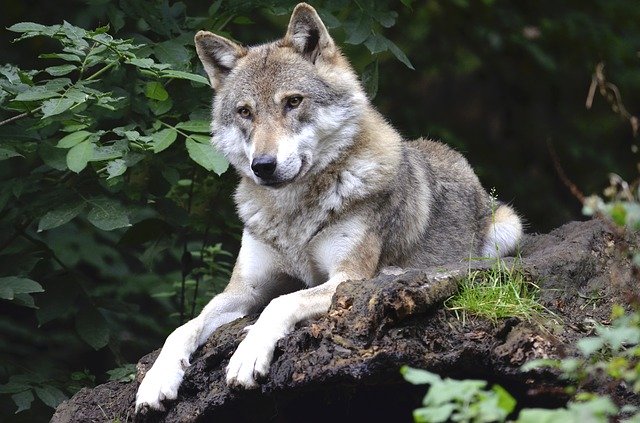Did you ever think of what life would be without dogs? I don’t just mean a temporary interlude between owning our best friend after our dog dies. What I mean is what if humans never domesticated friendly wolves and created dogs? Most of us “dog-people” couldn’t imagine it. But maybe there would be no humans either if there were no dogs.
Huh?
Possibly if early humans had not domesticated wolves to create a working partnership, our species Homo sapiens, would not have succeeded in outcompeting our closest relative, the extinct Neanderthals (Homo neanderthalensis).

Who are the Neanderthals?
As an adjunct Biology instructor at the College of Lake County, I tried to answer this question when I taught an evolution class.
Likely, you’re somewhat familiar with the term Neanderthals, those rougher, stockier versions of modern humans who went extinct about 40,000 years ago. Often thought of as brutish cavemen, but they used tools, fire, and made simple clothes. So they were essentially as knowledgeable, if not smarter, than humans since they actually had a slightly larger brain. Both species had common ancestors that migrated out of Africa but during different time periods.
Neanderthals evolved much earlier than humans, having become a separate species roughly 430,000 years ago. They migrated into the Middle East and then arrived in Europe around 250,000 years ago.
Modern humans (Homo sapiens) evolved in Africa some 200,000 years ago and migrated to the Middle East around 50 – 60,000 years ago, and reached Europe around 45,000 years ago.
So, for about 10 – 20,000 years both humans and Neanderthals lived in the Middle East. Some cross-breeding between the two similar species occurred and that is why many of us with European ancestry have a tiny amount of DNA that is from the Neanderthals.
Europe was dominated by Neanderthals until humans arrived 45,000 years ago, and then within the relatively short period of 5,000 years, the Neanderthals disappeared while humans thrived. What caused this change?
How Did Dogs Influence Human Evolution?
There is a new theory that the domestication of wolves into dogs may have influenced the rise of modern humans over Neanderthals, which Professor Pat Shipman’s presented in The Invaders: How Humans and Their Dogs Drove Neanderthals to Extinction. I’ll admit, I have not read this book and put it on my Christmas wish list. But I became fascinated with this topic through the article, The Longest Love Story, in the Fall 2019 issue of Bark.
Historically, researchers thought Neanderthals went extinct due to a cooling climate which would have altered plant and animal habitats. Neanderthals also lived in small groups and inbreeding may have weakened their genetics.
Shipman proposed a new idea based on recent studies showing that humans domesticated wolves around the same period that Neanderthals went extinct. Humans figured out how to use the wolf-dog to their advantage to hunt game. There is no evidence to suggest that Neanderthals used wolf-dogs.
Both humans and Neanderthals hunted large game like mammoth and other large herbivores, but they used different techniques. Humans used spears which could be launched from a distance while Neanderthals stabbed animals at close range, making it much more hazardous.
Shipman’s theory is that humans used wolf-dogs to track game and corner it while humans used spears to kill the prey—making it a win-win for both wolf-dogs and humans. Since Neanderthals didn’t use wolf-dogs to improve their hunting prowess and guard their camps from predators, humans became the dominant species within a few thousand years.
According to How hunting with wolves helped humans outsmart the Neanderthals, “Previously they (humans and wolves) separately hunted the same creatures, with mixed results. Once they joined forces they dominated the food chain in prehistoric Europe – though this success came at a price for other species… Humans and hunting dogs were, and still are, a deadly combination, says Shipman.”
Why this is a new theory is that wolf-dogs were thought to not have become domesticated until around 10,000 – 15,000 years ago, well after the Neanderthals went extinct, but new evidence is showing that the wolf-dogs were present with humans around 33,000 years ago, which would place this domestication around the time that the Neanderthals went extinct.
So if humans had not learned how to domesticate wolf-dogs, possibly the dominance by humans may not have occurred. Who knows maybe we’d all be Neanderthals and not own pet dogs!
What do you think? Do humans owe their success as a species to dogs?
For more reading, check out:
National Geographic, Did Dog-Human Alliance Drive Out the Neanderthals? https://www.nationalgeographic.com/news/2015/3/150304-neanderthal-shipman-predmosti-wolf-dog-lionfish-jagger-pogo-ngbooktalk/


I think it’s quite possible humans owe their success as a species to dogs, at least in part. We could be even more successful if we knew how to learn from them better.
What an interesting post, loved it and my answer is yes we do owe our success to dogs
Wow, this is a lot of interesting information. I really didn’t know that much about the Neanderthals. I think it is so cool that humans and wolves hunted beside each other. They helped each other survive and flourish. Thanks for Sharing. (From Ava, Dachshund Station)